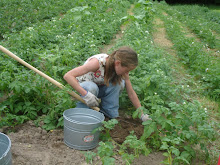
Wow, I’m impressed by the amount of early-bird CSA shoppers! For those of you who are already scouting for next year here are some details on my CSA:
Delivery Locations: I deliver to River Market Co-Op which is located in downtown Stillwater and Hampden Park Co-Op in St. Paul (928 Raymond Ave., fairly near Midway Stadium). I’m interested in adding a delivery to Hudson….but haven’t done any research on this yet.
Delivery Times: If things stay the same as this year (and I expect them to) I will be delivering to Stillwater on Mondays and St. Paul on Wednesdays. I drop the boxes off around 2:30 p.m. and members come pick them up between 3 p.m. and 9 p.m. It’s advisable to pick up your box on the day it is delivered; the co-ops may or may not hold boxes for CSA members.
Share Sizes: I offer full and half shares. All the shares come in the same size box (it’s cheaper to buy boxes that are all the same size). The boxes are bushel sized and I try to fill full share boxes and half fill half share boxes. In the beginning of the season this is not always possible, towards the middle of the season this can be a real challenge. In the thick of the this year’s season I was running 18-20 different types of veggies in the full-share folks’ boxes and 9-10 different types in half boxes.
Pricing: Full shares sell for $500 and half shares sell for $255.
Box Contents - Veggies, Herbs, Flowers and Eggs: I grow about 40 varieties of vegetables, some herbs and a few flowers for bouquets. I also have a small flock of chickens and put eggs in the boxes as I get them. Fruit is something I’m working on….I don’t promise any fruit but if I end up with some I’ll put it in the boxes (last year I was able to run apples and a few plums).
Is Eener’s Farm Organic: I’m not certified organic (a process I’m looking into) so I can’t advertise myself as organic. I do advertise as “Chemical Free” which means I don’t use any chemical pesticides or herbicides in my farming operations.
Our Season Length: In 2010 I’ll be doing 21 weeks starting the second week in June and going until the last week in October.
When to Sign Up: The 2009 members can sign up anytime. I’ll start taking brand-spanking-new members on February 1, 2010 (sign-up forms will appear on this blog).
This is all fine and good, but what the heck is a CSA anyway? Basically, a CSA (which stands for Community Supported Agriculture) is a type of direct market farm, meaning the farmer sells food directly to customers. There are a lot of advantages to this kind of farm. For one, customers/members know exactly where their food is coming from (we encourage our members to come visit the farm and we hold a big party at the end of the season for everyone). Secondly, produce from CSA farms doesn’t travel far. As a result it’s better for the environment and members enjoy much fresher produce. Another perk is that CSA farms tend to be really diversified (we grow about 40 varieties of veggies plus herbs and flowers and eggs) so members get a nice variety of in-season veggies.
Risk. Since farming is so completely tied to the weather, it’s risky business. My goal is to provide my members with an amount of produce that is equal to the money they paid for their share. In 2009 I think I accomplished this goal. But I can’t promise that this will be true for next year. It’s helpful to think of CSA farms in terms of the stock market; when members buy a share they are making an investment. On a good year they will break even or get an amount of produce that is greater in value than their initial investment. On a bad year, they may end up with an amount of produce that is worth less than what they invested. In buying a full season of produce, the members of CSA farms share the risk with their farmers.

